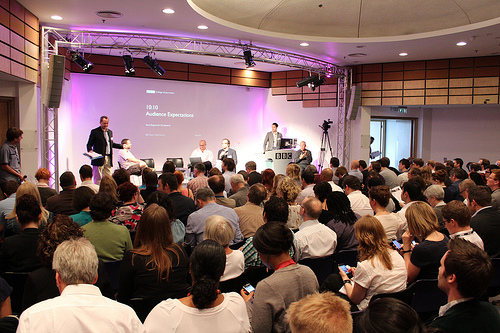Journalists need to shift their mindset to talking with — instead of at — the “people formerly known as the audience.”
That was a take-home message from the recent BBC Social Media Summit in London. It’s a notion others (including me) have written about in academic research regarding media representation of minorities. But it was The Guardian’s Meg Pickard who articulated the idea during the summit in reference to mainstream media approaches to social media. She told the over-packed conference room at the BBC headquarters in London, “Social media is a thing we do with an audience, not to an audience.”
The summit was a combination of controversially closed workshops operating under Chatham House Rules for invited mainstream media representatives from the world’s most recognizable media brands and a one-day open conference. The event, shorthanded by the hashtag #BBCSMS on Twitter, gathered international journalists, community media and academics interested in the development of a social future for journalism.
The event was criticized by some as too focused on legacy media and demonstrative of the slowness of some mainstream media outlets to adapt. And they had a point. I watched others cringe as one experienced journalist revived the brain surgery metaphor … you know the one: “You don’t crowdsource brain surgery, so why would you crowdsource journalism!?”

But while there was some evidence of residual pockets of resistance, at the other end of the spectrum, the very progressive editor in chief of the Guardian, Alan Rusbridger, demonstrated the transformative impact of social media on journalism. In his closing address, he rebadged social media as “open media,” saying, “People working in this generation of journalism just have to accept … open media is better than closed media.”
Precisely.
One thing was clear at the end of #BBCSMS: Audience engagement is now embedded in editorial processes. And the fear of audience interaction is no longer the barrier it was to journalists’ entry to social media when I ran a conference with the theme The Future of Journalism in the Social Media Age at the ABC in Sydney in 2009. Then, the question was “Why should we engage?” Now, it is “How can we best engage?”
And: “How do we manage the logistics of this new journalistic function?” and “How do we measure our success with engagement?”
Interestingly, the key themes identified in my original research on social journalism, summarized in a three-part series published on MediaShift two years ago — audience engagement; the merger of the personal and public spheres via social media; and verification issues — remain the big concerns confronting mainstream journalists practicing or managing social media.
VERIFICATION: STILL THE BIG ISSUE
“The biggest issue with social media is verification,” one journalist said to me during the invitation-only workshops staged in the BBC’s boardroom on Day 1, during which I acted as a facilitator-rapporteur. That statement was met with vigorous nods of agreement — from newspaper reporters and online editors to radio producers.
But how do you define verification? Can it evolve in the manner of a radio news story filling in blanks over time? Can it be crowdsourced, with media consumers acting as widely distributed fact-checkers with collective expertise? And what standards of verification and accuracy do audiences expect of professional journalists in the social media sphere?
What was clear from the conference was the great variety of approaches to verifying social media content within professional media organizations.
One participant reported: “Our default is to publish unchecked information with a disclaimer that it’s unverified.” Such an approach has become relatively standard for some of the world’s big media brands on breaking news stories, but many journalists remain concerned about the implications of this shift for professional practice and traditional ethics. There was debate about the methodology of crowdsourcing verification, often attributed to NPR’s Andy Carvin, with criticism of the practice from Sky News’ Neal Mann. Mann insisted that traditional journalistic processes of verification should be applied to tweeting. In his view, Carvin risks magnifying inaccuracy. I expressed the view that a combination of both approaches equates with best practice in social media verification terms.
At the very control-oriented, conservative end of the social media spectrum, another contributor reported that a political correspondent in his organization had her tweets vetted prior to posting as part of a strict social media policy that reflected residual corporate nervousness about accuracy and editorial integrity in the social media space. “If she’s on air, nobody vets what she says beforehand. But it’s a bit of a sop to management to have tweets checked before publication,” he said.
While some journalists spoke of simply transposing traditional processes of verification onto the Twitterverse, for example, by following up tweets with Direct Messages, phone calls and face-to-face meetings where appropriate, others talked of the need for technology development to assist the process and, importantly, appropriate newsroom resourcing for the tasks of verifying “User Generated Content” (as the BBC still refers to external editorial contributions) from myriad sources.
At the BBC, a critical role is played by a group of journalists attached to the UGC Hub — a desk in the center of the London newsroom that seeks to verify social content.
One idea emerging from Day 1’s closed discussions that fascinated me was the concept of various platforms being imbued with different standards of verification and audience expectations.
One participant spoke of the lower threshold for publication of unverified information on Facebook: “We might put it out there unverified on our Facebook page, but we wouldn’t print it until we’d verified it.” And another print journalist shared a similar approach: “Our journalists use social media to correct over time, in between print runs.”
These comments reflect a view within the mainstream media that audiences have lower expectations of accuracy and verification from journalists’ and media outlets’ social media accounts than they do of “appointment TV” or the printed page, for example. As one participant observed, “It’s deeply insulting and condescending to audiences to assume they can’t tell the difference between professional and personal social media publication by journalists.”
WHAT DOES ‘OPEN MEDIA’ LOOK LIKE?
While the themes of the discussions at BBCSMS appeared at times to have hardly shifted from 2009, there were many examples of progress and, in particular, four big names showcased how social media is creating openness, collaboration and creativity in legacy media: Al Jazeera, the Guardian, The Washington Post and The New York Times.

Esra Dogramaci, Al Jazeera Turkish social media coordinator, offered a useful formula for distilling social media content:
(Information – noise) + context = responsible reporting
She also told the conference about Al Jazeera’s role in the Middle East as a social media trainer and equipper of citizen journalists — functions that became important during the Arab Spring when attacks on Al Jazeera from regimes under fire resulted in reliance on unofficial correspondents who’d been trained and equipped by the Qatar-based broadcaster.
Dogramaci’s address was one of the most impressive of the conference, but she was questioned by senior BBC journalists in the audience, who effectively accused Al Jazeera of facilitating revolutions. The inference was that an activist model of journalism, particularly one that involves “collaboration” with citizens and equips them to report, was incompatible with professional journalistic practice and the value of objectivity. In the context of a global conference on social media, that view seemed particularly narrow.
While the Guardian’s representatives demonstrated why they’ve so successful in the social media space, with an emphasis on openness, the Washington Post’s managing editor Raju Narisetti highlighted the importance of metrics in effecting cultural change within newsrooms reluctant to enter the social media age: “Show them the metrics. Link the move to audience and ego,” he urged.
Meanwhile, one of the New York Times’ social media editors, Liz Heron, announced the move to humanize the NY Times’ main Twitter news feed which, up until last month, operated as a cyborg account. She reported to the conference that a blend of personal and professional content was proving most successful in reporters’ efforts to build audience via social media, pointing to Nick Kristof’s successful approach to Facebook journalism.
WHAT’S NEXT?
Despite the organizers’ stated desire to avoid another talkfest about social media, that’s precisely what #BBCSMS was. But that’s not necessarily a bad outcome. Opportunities for reflective practice in journalism are few and far between. The consequence: Nowhere near enough critical examination of the profession by practitioners once they graduate from journalism school. And talking generates ideas that can trigger action and relationships across geographic, cultural and corporate boundaries. This, in turn, could help mature the profession’s engagement with social media.
The event had some ambitious (and as yet unfulfilled) goals, including the possible formulation of a universal set of social media principles for journalists. The key goal, articulated by one of the conference organizers, Claire Wardle, was to generate real action from the conversations. And she concluded the conference by challenging participants to ask themselves “So what?”
So, what now? Well, for my part, I outlined some research goals designed to steer a course for scholars investigating the impact of social media on journalism ahead of the conference.
And, in the aftermath, I established a Facebook page (curated in partnership with some of the other academics involved in #BBCSMS) designed as a research incubator to connect researchers, journalists, start-ups, media outlets and developers. So, that’s one tangible outcome. But sustaining the conversation and facilitating funded research outcomes from that initiative will be the real test. More broadly, the vibrant conversation started during the event continues under the #BBCSMS hashtag on Twitter.
For journalism educators grappling with how to train the next generations of journalists, the message from the summit was clear: The Guardian’s Pickard said she expects all journalism students to be tweeting in their first year, while the Washington Post’s Narisetti said he looks for evidence of social media skills during recruitment.
As for ongoing attempts at converting those social media detractors and cultural change resistors lingering in the dusty corners of some newsrooms? A combination of carrot and stick approaches was suggested, while the benefits of mentoring from senior journalistic converts were also mentioned. But one of the participants in the Day 1 workshops summed it up best for me: “It’s been long enough. Time to stop encouraging and tell them to just get on with it.”
Julie Posetti is an award-winning journalist and journalism academic who lectures in radio and television reporting at the University of Canberra, Australia. She’s been a national political correspondent, a regional news editor, a TV documentary reporter and presenter on radio and television with the Australian national broadcaster, the ABC. Her academic research centers on journalism and social media, on talk radio, public broadcasting, political reporting and broadcast coverage of Muslims post-9/11. She’s currently writing her PhD dissertion on ‘The Twitterisation of Journalism’ at the University of Wollongong. She blogs at Twitter.

